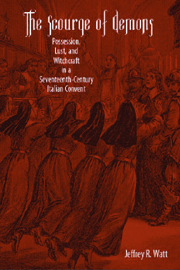Book contents
- Frontmatter
- Contents
- List of Illustrations
- Acknowledgments
- Introduction: Nuns, Witchcraft, and the Inquisition
- Chapter 1 Female Religious, Claustration, and Santa Chiara of Carpi
- Chapter 2 The Outbreak and Maleficia
- Chapter 3 The Confessor and Love Magic
- Chapter 4 The Exorcists and the Demons
- Chapter 5 Sisters Dealta and Ippolita under Attack
- Chapter 6 Bellacappa's Defense
- Chapter 7 The Waning of the Possessions
- Conclusion
- Appendix A
- Appendix B
- List of Abbreviations
- Notes
- Selected Bibliography
- Index
Chapter 6 - Bellacappa's Defense
Published online by Cambridge University Press: 12 September 2012
- Frontmatter
- Contents
- List of Illustrations
- Acknowledgments
- Introduction: Nuns, Witchcraft, and the Inquisition
- Chapter 1 Female Religious, Claustration, and Santa Chiara of Carpi
- Chapter 2 The Outbreak and Maleficia
- Chapter 3 The Confessor and Love Magic
- Chapter 4 The Exorcists and the Demons
- Chapter 5 Sisters Dealta and Ippolita under Attack
- Chapter 6 Bellacappa's Defense
- Chapter 7 The Waning of the Possessions
- Conclusion
- Appendix A
- Appendix B
- List of Abbreviations
- Notes
- Selected Bibliography
- Index
Summary
Santa Chiara's witchcraft case was, for the most part, merely an investigation and not a full-blown trial. Although Sister Dealta Martinelli was kept in isolation for several months during the investigation, the Holy Office never formally charged her and, though eventually given an opportunity to speak her mind, she did not have to prepare an actual defense. By contrast, Father Angelo Bellacappa did prepare a defense, supported by a talented canon lawyer. As we shall see, this was far more in response to the accusations of solicitation than of witchcraft.
In August 1638 Inquisitor Tinti ordered the arrest of Bellacappa, who was taken into custody by the Holy Office in Bologna, where he had been residing at the Annunziata monastery, and was then transferred to the Inquisition's prison in Modena. Tinti began interrogating Bellacappa on 9 August 1638, almost four months after the questioning of the sisters of Santa Chiara began. For the first time since the beginning of this investigation, Tinti conducted hearings in the Inquisition's own building in Modena. Brought out of prison, the forty-seven-year-old Bellacappa, Observant Franciscan and professor of theology, in response to the formulaic questions asked of all suspects, claimed he had no clue as to why he had been imprisoned and why he was being questioned by the Holy Office. Asked about his current office, Bellacappa replied that until his arrest he had resided at the monastery in Bologna and that his profession within the order had always been to teach theology.
- Type
- Chapter
- Information
- The Scourge of DemonsPossession, Lust, and Witchcraft in a Seventeenth-Century Italian Convent, pp. 157 - 180Publisher: Boydell & BrewerPrint publication year: 2009

